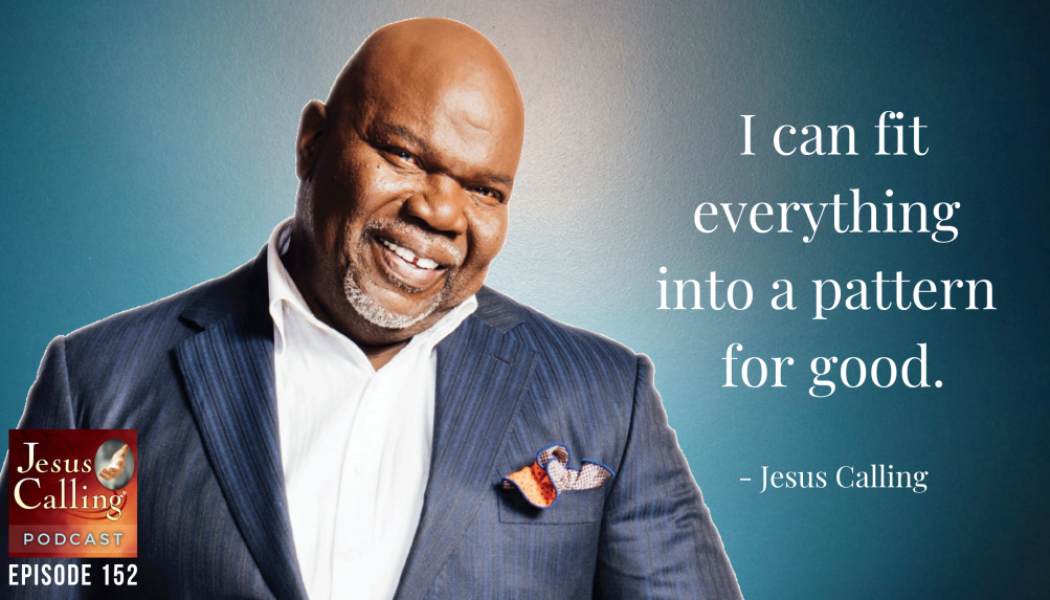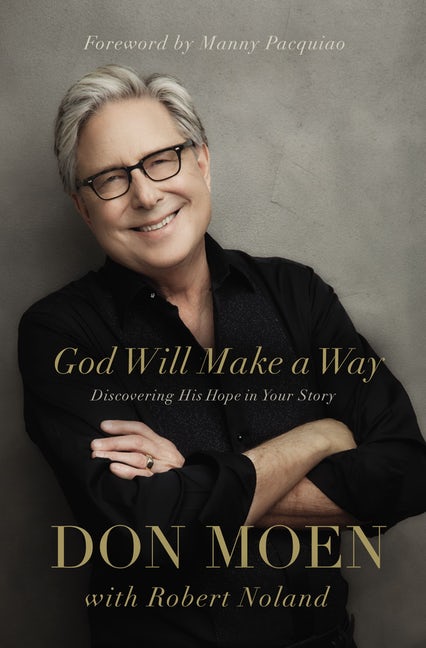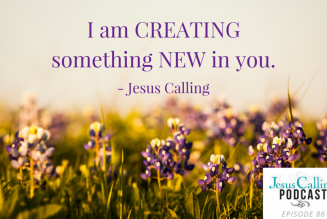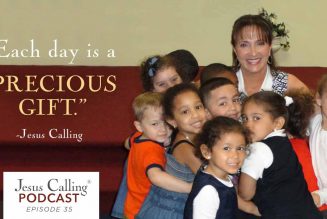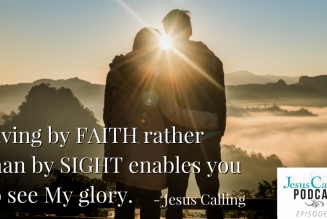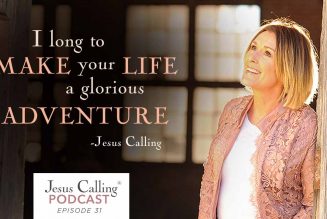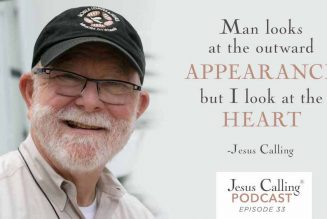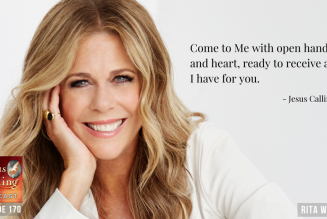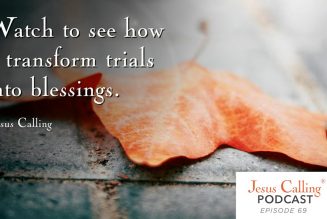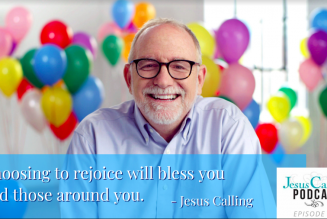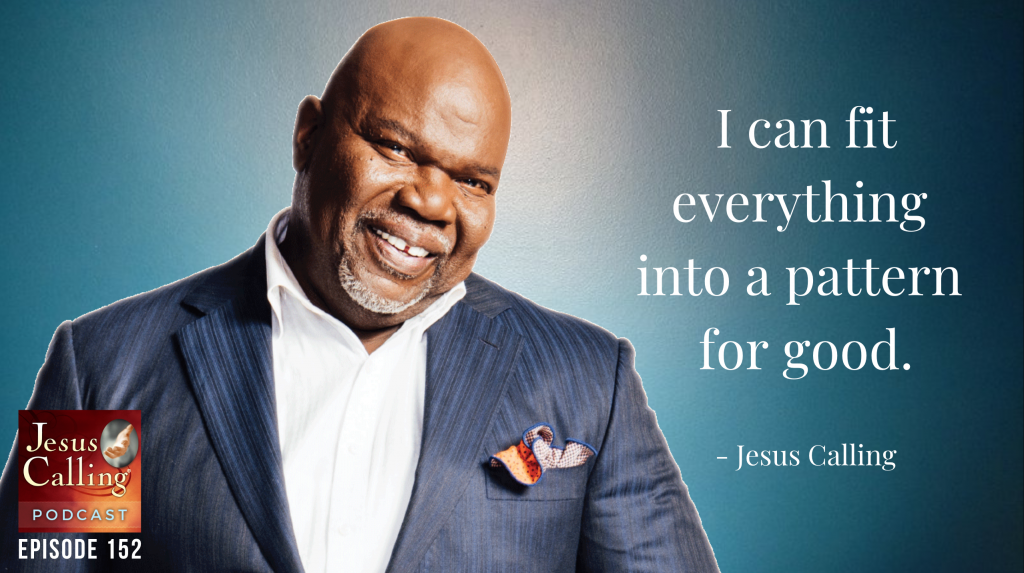
T. D. Jakes: I’m at that stage of my life now that I really want to leave footprints behind about what it really costs to be who you are and how to survive crushings that people don’t see, because they see you only through the window of how they understand you to be. But life is much bigger than 30 minutes on television or an hour on television. Life is much bigger than 8 hours on a job. And sometimes we make assumptions about people we work with, or live next door to, or we see on TV that are not correct assumptions about what their whole life is like.
When There Seems to Be No Way, God Is Still Working: T. D. Jakes and Don Moen – Episode #152
Narrator: Welcome to the Jesus Calling Podcast. Our guests today find solace in the scripture from Romans 8:28 that says, “And we know that in all things God works for the good of those who love Him, who have been called according to His purpose:” pastor & author Bishop T. D. Jakes and worship leader Don Moen.
Up first is T. D. Jakes: author, film producer and senior pastor at The Potter’s House Church in Dallas, Texas. Bishop Jakes has seen his ministry soar to great heights, speaking in front of thousands and touching many more lives through his various ministries. Yet through some of his most successful days of ministry, Bishop Jakes has experienced what he calls life’s “crushing” moments, and his status as a well-known minister has not kept him immune from pain and despair. With compassion and understanding, Bishop Jakes relates his own experiences of being “crushed,” and helps us reconcile difficult times with God’s promise that He will work all things together for our good.
T. D. Jakes: My name is T. D. Jakes, Thomas Dexter Jakes. I’m the senior pastor at The Potter’s House. I’m also a film producer and author and an entrepreneur.
God Can Work Good from Our Crushings
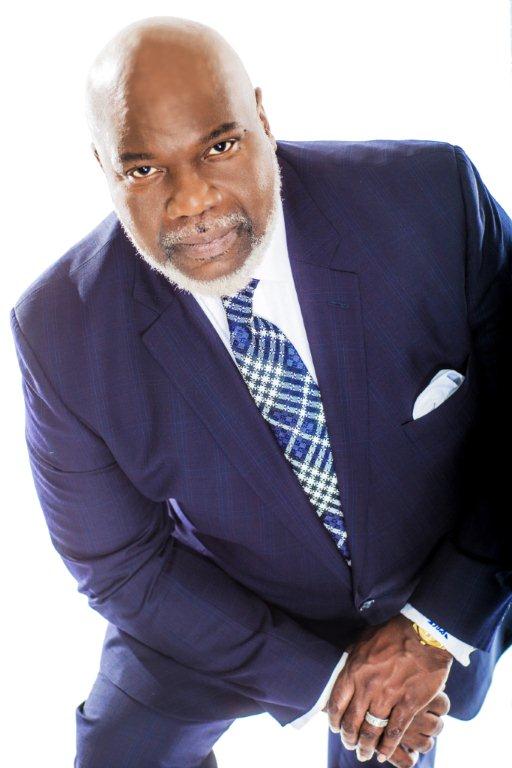
People often make the mistake of thinking that because a person is on television, or because they are successful, or because they are young or because they are beautiful—whatever the “because” is—that they are exempt from pain. Just because you don’t see it doesn’t mean that we don’t suffer.
In my own life, [I’ve had] lots of crushings and crushing moments and times that I thought I wasn’t going to make it. Parts of me didn’t make it so that other parts of me could make it.
I wrote [my latest book Crushing for] people who are dealing with pressure, or have dealt with pressure, or are stuck in a crushing moment in their life [to show them] how to survive the crushings that are inherent with being a human being.
Crushing, in its purest form, is where the external pressures become so strong that they begin to make indentations in pressure from the object separate the pressure. It really deals with pressure in all of its forms.
My father got sick when I was 10 and suffered renal failure. His blood pressure went up to 290/280, and his kidneys collapsed. I grew up with kidney machines and in hospitals most of my life. He died when I was 16 years old. That was the big crushing of my childhood.
[Another crushing was] the passing of my mother much later in my life, who died of Alzheimer’s while my ministry was exploding. My church was growing up and my mother was going down at the same time, and I was being crushed in between the demands of both. She ultimately died in my arms.
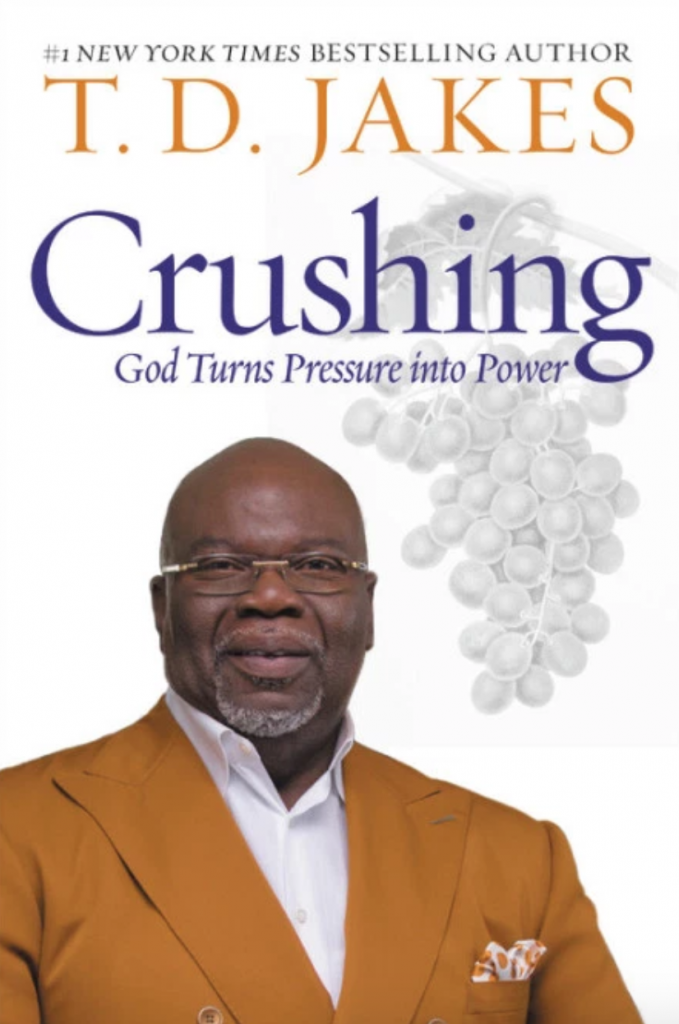
My mother-in-law preceded her death. My daughter got pregnant as a teenager. All of that was happening at the height of my ministry. And so those were very strong crushing moments of my life and made me want to write to other people who were going through different types of crushings in their lives, and maybe to be able to shed some insight about those moments that I was surviving.
The whole book is inspired from looking at Jesus at the Passover, lifting up the cup to say the new [covenant] was in His blood. And suddenly I realized that the experiences of the grapes that made the wine were the experiences that He was about to confront, that the grape was raised to be crushed and Christ was born to die. The grape was raised to be crushed, so that [it could enter] into the state of becoming wine, and Christ was born to die so that He might be raised from the dead and be our ever living Savior.
The cross itself was a horrific emblem of suffering and shame. It was not something that Jesus enjoyed. The Bible says He despised the shame of it, but for the joy that was set before Him, He endured the suffering of the cross.
“The cross itself was a horrific emblem of suffering and shame. It was not something that Jesus enjoyed. The Bible says He despised the shame of it, but for the joy that was set before Him, He endured the suffering of the cross.” – T. D. Jakes
So many times in life, while we’re going through it, it’s hard to remain upbeat. In the book, I’m not suggesting that crushing is enjoyable and that you should ask, “Come on, Lord, please crush me.” No. Jesus said, “If it be Thy will, pass this bitter cup from Me.” And so it wasn’t something that He enjoyed, and yet at the end of the day, when all was said and done, it worked together for our good. It worked together to reveal who He really was when He proved Himself to be Lord over death, hell and the grave.
Let’s work on that verse a little bit, [Romans 8:28]. It says, “All things work together for the good.” It doesn’t say that all things are good. It said they work together for good. That means there may be some things that are bad that still work together for good.
“There may be some things that are bad that still work together for [our] good.” – T. D. Jakes
A good illustration of that is if you’ve ever tasted baking powder by itself, it tastes horrific. But if you work it in with the other ingredients, it has a purpose that makes bread or a cake rise. There are certain things in your life that make you rise that are bitter when you taste them. And I think that’s what the text was saying. “All things work together for the good of them that love the Lord, who are called according to His purpose.” Your purpose is often directed by negative things that push you to being who you become.
Be Gentle with Those Who Are Crushed
To tell yourself that you don’t have enough faith is to be like Job’s friends to try to explain why this happened. “It must be something that you did.” Or [some might ask,] “Who sinned, the mother or the father, that the child should be like this?” People say little things trying to be helpful that are really quite damaging to people who are crushed.
You have to be gentle with people that are hurt. You have to be empathetic. There’s nothing worse than having somebody snatch you out of bed the day after surgery or be inconsiderate to your pain and your suffering. People who are effective when working with hurting people are effective because they respect the other person’s pain, and they’re gentle with what they say do to make them better.
“You have to be gentle with people that are hurt. You have to be empathetic.” – T. D. Jakes
That’s why we need ministry. That’s why we have worship music and play that sort of thing. We have Christian television ministry. We have tapes we can listen to. We need devotionals of all types because sometimes when we have been raised in the faith or raised around the faith, we’re certain that everybody knows how to be devout, when in reality sometimes people don’t know how to pray, some people don’t know how to get close to God. And to have some guidance in the ritual—whether it’s in print, or in a book form, or audio, or anything that will help you to learn how to be more successful at things that other people take for granted—is really very important.
This is a passage from Jesus Calling for March 19:
I speak to you from the depths of your being. Hear Me saying soothing words of Peace, assuring you of My Love. Do not listen to voices of accusation, for they are not from Me. I speak to you in love-tones, lifting you up. My Spirit convicts cleanly, without crushing words of shame. Let the Spirit take charge of your mind, combing out tangles of deception. Be transformed by the truth that I live within you.
The Light of My Presence is shining upon you, in benedictions of Peace. Let My Light shine in you; don’t dim it with worries or fears. Holiness is letting Me live through you. Since I dwell in you, you are fully equipped to be holy. Pause before responding to people or situations, giving My Spirit space to act through you. Hasty words and actions leave no room for Me; this is atheistic living. I want to inhabit all your moments—gracing your thoughts, words, and behavior.
The amazing thing about Christianity, to me, is that it is the toughest altar call ever. When Jesus says, “Hey, if you want to be My disciple, pick up your cross and follow Me. I’m getting ready to die.” That’s not an invitation that’s very pleasant. Yeah, it’s honest, and it’s open, and it’s real, and it’s raw, and is true.
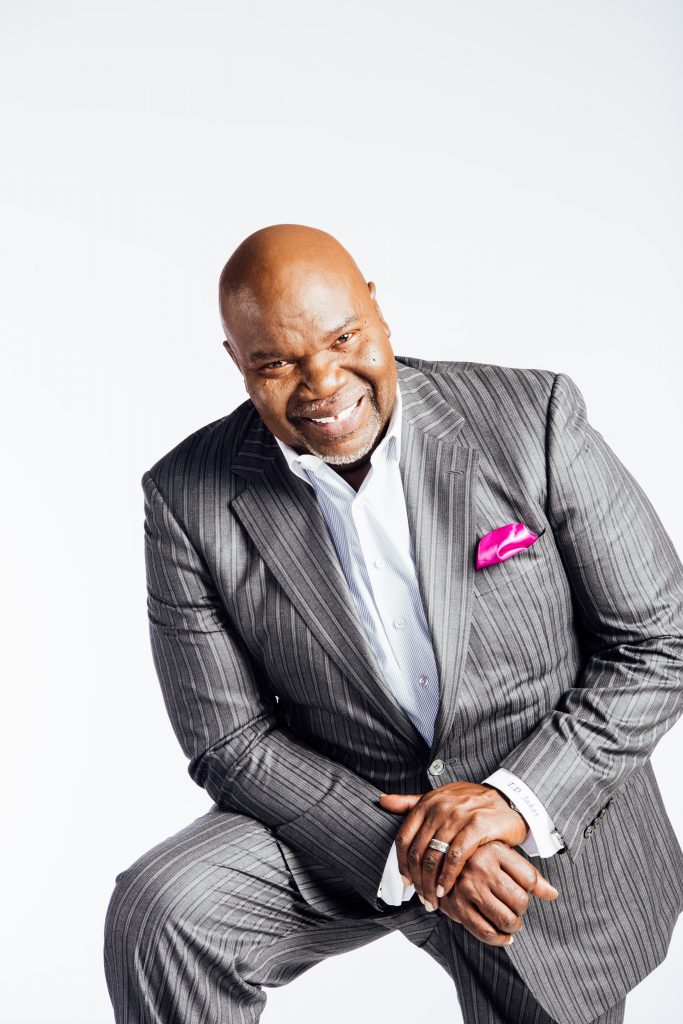
I think we’ve moved too far away from that and make people think that being a Christian means that Kool-Aid is going to come out of the water fountain—everything’s going to be wonderful in your life. [That’s] false advertising. The reality is many times God develops us through the crushing. God develops the world around us. And sometimes when you look for the good that’s going to come out of the crushing, sometimes that good comes out of your children, that comes out of your environment around you to witness to your neighbors. But there will be something good that comes out of it, if you can resist the temptation to become bitter and take the more difficult choice of becoming better.
“God develops us through the crushing. God develops the world around us. . . . There will be something good that comes out of it, if you can resist the temptation to become bitter and take the more difficult choice of becoming better.” – T. D. Jakes
Narrator: Bishop Jakes’ new book Crushing: God Turns Pressure into Power is now available wherever you buy books.
Narrator: We’ll be right back with more of the Jesus Calling Podcast and our next guest—worship singer, songwriter and producer Don Moen—after this brief message about a free offer from Jesus Calling.

Want a daily reminder that we can have hope, peace and joy each day in Jesus? Now it’s as easy as opening an email. The Jesus Calling Daily Email brings you a thought from the Jesus Calling family of devotionals every day. Brighten up your inbox with this little reminder and take a minute to connect with God during your day. To sign up to get your free, daily thought from Jesus Calling, please visit Jesus Calling.com/daily-email.
Narrator: Our next guest is a legendary songwriter and singer of worship songs, including the long-beloved anthems “Give Thanks” and “God Will Make a Way,” Don Moen. After three decades in ministry, Don’s mission, in his own words, is “to be an architect who designs products and events that help people experience God’s presence in a new and fresh way.” Don shares some of the life events that steered him toward being one of the forerunners of the praise & worship movement and what he’s learned along the way, which he also details in his new book God Will Make a Way: Finding His Hope in Your Story.
Don Moen: I’m Don Moen. I’m a worship leader and songwriter. I’m husband of one wife, father of five kids. I worked for Integrity Music for 20 years as a worship leader, songwriter, producer, music executive. And now I’m an author.
An Unlikely Road to Becoming a CCM Artist

I was raised in the northern part of Minnesota. I like to joke that our Norwegians, Swedes, and other fur-bearing animals are living up there. My father was confirmed in the Norwegian Lutheran Church. My mother took us kids, and we all got saved at an Assemblies of God church. I mean, [we were from a] small town in northern Minnesota. [I had an] older brother, two younger sisters, and just a small community. I was kind of raised in this tiny little church.
My mother forced me to play the piano, forced all of us kids to take piano lessons, and I hated it. She forced us to sing in church. I hated that. But you know, it was a really good childhood.
Music was around us all the time. My mother was a piano player in the church. I played trombone and violin, and sang with my brothers and sisters. So that was that was life in northern Minnesota.
I actually got a scholarship to play violin at the University of Southern Mississippi, so that’s what I thought I would do for the rest of my life. I was studying music education.
I didn’t want to go to school. I wanted to join the Navy when I was in high school. All I wanted to do was be in an airplane, fly a fighter jet. That’s what I wanted to do. But because I wore glasses, they wouldn’t allow me into flight school. So my backup plan was to be a forest ranger in the Forest Service because I like to hunt and fish, and that made sense to me.
I got this scholarship for violin, so I went to college and played in a lot of symphonies, a lot of operas, ballets, and all that stuff. And then that was getting boring to me, so I quit and went back to Minnesota, became a lumberjack, started logging in the northern woods of Minnesota in the middle of winter with the roughest bunch of guys you’d ever want to meet.
After a few months of that, I thought, Maybe playing violin isn’t as bad as I thought. So I went and visited a friend out at Oral Roberts University. I auditioned on my violin and got a scholarship there, and that’s where I started getting an interest in Christian music.
A long time ago, back in the early 70’s, contemporary Christian music was just getting started. So at that point, I got an interest in Christian music. I joined a a touring group, a missionary evangelistic musical group called Living Sound. I got on the bus and told my family I’d be gone for a six-month tour. 10 years later, I got off the bus. So that was it. That’s how I got into the into the whole music side of things.
I did not ever try to be an artist. I never wanted to be an artist. In some ways, I still don’t want to be an artist, this business of me being on a stage and being the focal point. I’m an introvert.
“I did not ever try to be an artist. I never wanted to be an artist.” – Don Moen
My wife will tell you if we go to a party with lots of people, because of what I do onstage, people think I’m this extrovert guy. But if we go to a party I’ll say to Laura, “What if somebody says hello to me? What do I say?”
She goes, “Say hello.”
So give me one or two people, but oh my gosh, a larger group of people? Here I am on a stage, all the time [I’m] in front of large groups of people. What people don’t know about me is that I failed my speech class at Oral Roberts University. There were, I think, 15 or 20 students in the class, and I got an F because I could not get in front of 15 people and give a speech. That’s how petrified I was of being in front of people. So the fact that I’m an artist at all is amazing.
Learning to “Give Thanks”
When “Give Thanks” came out, I recorded that in May of 1986, and it was released in January of ‘87. When we recorded it, I don’t think anybody really knew that we were in the middle of something big.
I remember Mike Coleman, who is the president and co-founder of Integrity Music, saying, “Don, this cassette could sell as many as 50,000 units,” and it sold well over a million units. So I don’t know that anybody saw that coming.
[embedded content]
We were right in the middle of a huge emphasis on worship. We were just kind of swept up in that whole thing. And boy, I look back on those days and I think, What an honor to be in the middle of that.
In the early years of Integrity, we realized this was a move of God. And the big challenges, once you started growing so fast . . . we had a whole company—then, it was about 65 people—focused on one product. We didn’t have multiple lines of product. We had one product, and it was called Hosanna Music. Everybody was working on that one product and everybody was praying. Everybody was believing in the Lord, and it just took off.
And then suddenly, we have a very large company with a lot of money coming in. People with operational skills come in to say, “Now, we need to control you creative people and put parameters around what we do and how we do it.” And I think that’s necessary. All the gifts need to come together. But boy, the danger is trying to control the move of the Holy Spirit and the move of God.
People say, “Okay, now we’re gonna organize this so we can control the move of God.” And I think when it’s a move of God, you have to just kind of hold it open-handed and allow the Lord to do what He wants to do. And as human vessels, we need to just get out of the way and let God do what He wants to do. So that was a real privilege to be involved in that, in a genuine move of God.
“And as human vessels, we need to just get out of the way and let God do what He wants to do.” – Don Moen
Finding that “God Will Make a Way”
“God Will Make A Way” has probably become one of my most recognizable songs. People associate that song with me. And it was written for a pretty desperate situation in my family when my little nephew was killed in a car accident. But it’s not a song of desperation, you know, it’s a song of declaration: God will make a way.
My wife’s sister and husband had been heading to Colorado on a ski vacation from Oklahoma, and their van was broadsided by an 18-wheeler in the middle of the Texas panhandle. Three little boys were seriously injured and the oldest boy, who was 8 years old, was killed.
So there they were, out in the middle of nowhere, and I get a call at 10:30 PM from Laura’s mom and she said, “There’s been a terrible accident. Susan and Craig were involved in a wreck, and Jeremy is dead.”
When I heard the news, I felt so absolutely helpless, because you’re hundreds of miles away. What do you do? So all the scriptures come into my head. “All things work together for good.” You know?
There’s nothing I could share that would seem to bring comfort. I did call them in the hospital, and I encouraged them.
I had a big recording session scheduled on the west coast the next day. I called to cancel the session, and they had already booked the orchestra and all this stuff, and I couldn’t cancel it. I felt so, so helpless and frustrated.
I got on the airplane and I just . . . and the funeral was going to be in a couple of days. So I was flying out to that session and just reading from Isaiah 43, praying on the airplane that God would give me something to say to Susan and Craig that would be a word from the Lord rather than, “Hey, Craig, here’s the scripture. Hey, Susan, have faith.”
And on the airplane reading from Isaiah 43: 18–19, it says “I don’t remember the former things. Behold, I will do something new and now it will spring forth. I’ll even make a roadway in the wilderness and a river in the desert.”
I wrote down the words to that song to sing to them privately. I thought I would sing it at the funeral, but at the funeral, they wanted me to sing “Give Thanks.” So that’s what I did. And then privately, I got with Susan and Craig and I said, “The Lord gave me this song for you. God will make a way where there seems to be no way.”
”God will make a way where there seems to be no way.” – Don Moen
[embedded content]
I knew there would be days after the funeral when everybody would leave, and Susan would walk into a closet and see Jeremy’s clothes hanging in there, and it’s like, “Susan, you just gotta believe that this. I know this looks hopeless, but you have to believe that God is not finished with you guys, and there is going to be life after this.”
So I just sang it for them privately, and I put it away and didn’t sing it again for a few years.
I was in Dothan, Alabama—why do I remember that? I was singing in Dothan, Alabama. And while I was singing, the Lord brought this song back to my mind. I had to pull out my legal pad, and I was flipping through these pages. I said, “I think I’m supposed to sing this song.” So I sang the song, and it really had an impact on the audience.
In the next couple of days, there was a devotional, a weekly devotional at Integrity Music. I thought, I’m going to try to sing it to the staff of about 65 people there. I sang that song, and everybody seemed to need that message that day. They came up to me and said, “Where did you get that song?”
I said, “I wrote it for a kind of private family tragedy.”
They said, “You need to record it.”
I said, “I don’t think I ever will. It was just for this special occasion.”
Anyway, eventually I did record it, and now it’s become probably one of my most well-known songs and the title of my book.
Hope is Our Life Saver
I think a lot of people look at [title, God Will Make a Way] and think, Is there a chance that He will? I hope He will.
People are going through a lot of challenging things, whether it’s a doctor’s report, or a financial situation, loss of a job, divorce, or death in the family. I mean, there’s everything. Any one of those things can throw you into a world of hopelessness.
After 12 years of not being able to have kids, we had 5 kids in 7 years. So they were all teenagers together, and you just can imagine early in the morning there, heading out to school. I failed miserably at being the father [who said,] “Children, let’s kneel down over on the table and have a word of prayer.” And it wasn’t happening at the Moen household, but Jesus Calling worked. If you ask any one of the kids, they’d probably still tell you of me shouting my own version of Jesus Calling devotional as they’re getting in their trucks and cars leaving. “Jesus Calling! Don’t worry about what you see! Trust in Me! I am there for you!” I’d make up these things.
It was just short enough and poignant enough to read to the children before they headed off to school. That’s how Jesus Calling became a big part of our lives. In fact, I just read one passage today. This is from November 3rd. I mean you can pick any day. This has something to do with just disappointments and people [who] get a setback in their life and they begin to lose hope. Listen to this:
“Every time something thwarts your plans or desires, use that as a reminder to communicate with Me.”
This is great because I can just hear myself saying this to the kids.
“This practice has several benefits. The first is obvious: Talking with Me blesses you and strengthens our relationship. Another benefit is that disappointments, instead of dragging you down, are transformed into opportunities for good. This transformation removes the sting from difficult circumstances, making it possible to be joyful in the midst of adversity.
Begin by practicing this discipline in all the little disappointments of daily life. It is often these minor setbacks that draw you away from My Presence. When you reframe setbacks as opportunities, you find that you gain much more than you have lost. It is only after much training that you can accept major losses in this positive way. But it is possible to attain the perspective of the apostle Paul, who wrote: Compared to the surpassing greatness of knowing Christ Jesus, I consider everything I once treasured to be as insignificant as rubbish.”
What a great word for us today, just a word of hope.
When people go through different situations, a difficult situation, you want to say, “Have faith. Have faith.” Well, a lot of people don’t have faith. But hope . . . if they lose hope, they lose everything.
I’ve seen in my travels that [hope is] the one thing people need. And for someone who’s never accepted Christ as their Savior, they first have to have hope that there’s a chance for them. Hope that in spite of the way the checkbook looks, hope in spite of what the doctors said in the report, hope in spite of the loss of a loved one that tomorrow’s another day and that God is working in ways they cannot see. If people can grab a hold of that one line—“He works in ways we cannot see”—I can just feel them grabbing onto that life saver, that little life preserver of hope.
“We look at setbacks in our lives sometimes as way too permanent, but God uses these setbacks to bring us to the place where He wants us to be, to help transform us into the men and women He wants us to be.” – Don Moen
Narrator: Don Moen’s book God Will Make a Way is available wherever books are sold.
Narrator: Next time on the Jesus Calling Podcast, we talk with Rich Wilkerson, Jr. pastor at VOUS Church. Rich descends from 4 generations of pastors in his family, including David Wilkerson, the writer of the classic Christian book, The Cross and the Switchblade. Rich talks about how his early view of God shifted from judge to loving Father.
Rich Wilkerson: Ultimately the way that you view God is going to dictate how you receive and communicate with God. And it wasn’t until I was much older that I began to really discover who Jesus was. I think in discovering who Jesus was, it’s fully shifted my paradigm of who God is that God is a loving Father. He’s not behind the bush waiting and watching as you make a mistake to punish you, but rather He’s there that when you do make a mistake, He wants to pick you back up.
